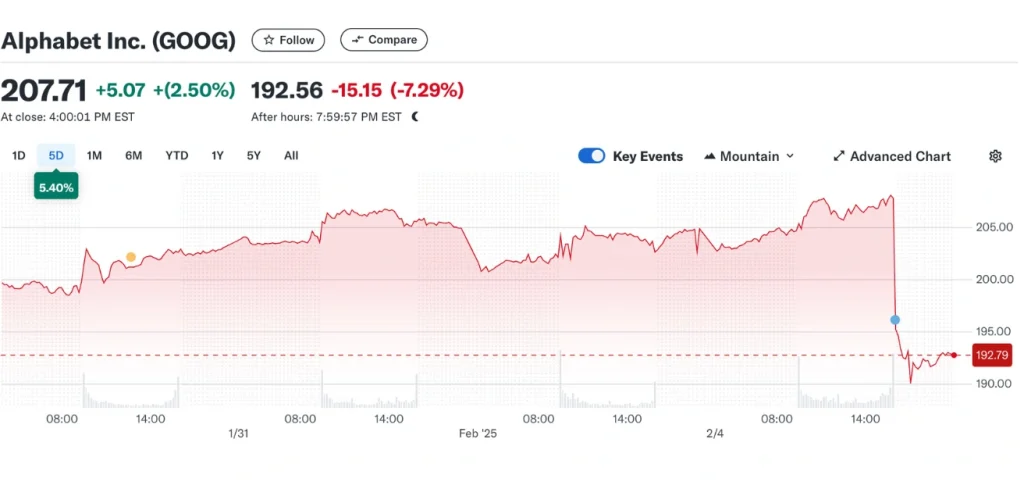
Google’s $75 Billion AI Investment in 2025
Google’s CEO, Sundar Pichai, recently revealed that the company plans to invest a significant $75 billion in capital expenditures (CapEx) in 2025, with a large portion of this funding aimed at advancing its artificial intelligence (AI) infrastructure. This announcement comes as part of Alphabet’s Q4 2024 earnings report, highlighting a 43% increase from the $32.3 billion spent in CapEx in 2023. Pichai emphasized that this boost in investment is a strategic move to drive AI innovation and strengthen Google’s core business operations.
Why Google’s $75 Billion AI Investment Matters
1. AI Infrastructure Development
Google is positioning itself in direct competition with other tech titans such as Meta and Microsoft, both of which have committed billions to their AI projects. Meta has announced plans to allocate $65 billion to AI infrastructure, making this an increasingly competitive space for AI supremacy. Google’s aggressive investment signals its determination to stay ahead in this fast-evolving sector.
2. AI-Driven Revenue Growth
AI has become one of the most significant revenue contributors for Google in recent years. According to the Q4 financial report, Google’s total revenue saw a 12% increase, reaching $96.5 billion, largely driven by advancements in AI technologies. This indicates how pivotal AI is in not only enhancing the company’s operations but also propelling its financial growth.
3. Google Cloud’s 10% Growth
Google Cloud, a key arm of the company, saw a 10% revenue growth, reaching $12 billion. Pichai attributes this increase to the steady demand for cloud products, AI infrastructure, and generative AI solutions. This reinforces the importance of AI investments in driving the success of Google’s cloud services.
Read More: DeepSeek: The Rise of China’s AI Revolution and Global Tech
The Impact on the Market
Stock Market Response
Despite the bold investment announcement, Alphabet’s quarterly revenue of $96.5 billion fell slightly short of analysts’ expectations ($96.7 billion). As a result, the company’s stock saw a 7% drop during after-hours trading, illustrating the market’s cautious stance despite the positive long-term outlook on AI growth.
Competitive Pressure: China’s DeepSeek AI Models
During an investor meeting on February 4, Pichai highlighted the capabilities of Google’s Gemini 2.0 Flash models, positioning them as some of the most efficient AI models available globally, even in comparison to China’s recently announced DeepSeek models. DeepSeek, which launched its advanced AI models on January 27, 2025, has raised concerns in U.S. markets due to its ability to develop cutting-edge AI technologies with minimal investment (less than $6 million) and more affordable hardware compared to Nvidia’s processors. Pichai downplayed these concerns, asserting that Google remains on course to lead the AI race.

The Broader AI Investment Landscape
Capital Expenditures (CapEx) and Their Role in AI Development
CapEx refers to the funds a company uses to acquire or upgrade long-term assets such as infrastructure, equipment, and technology. For tech giants like Google, CapEx investments in AI infrastructure are crucial to staying competitive in a space that demands constant innovation.
Why Is AI Investment So Important?
- Increased Productivity: AI helps companies improve efficiency, reduce operational costs, and optimize their performance.
- Innovation in Products and Services: Companies like Google, Meta, and Microsoft invest heavily in AI to create new and better products and services, expanding their market offerings.
- Competitiveness: Without investing in AI, companies risk falling behind competitors who are actively shaping the future of the industry.
The Global Market Impact of Google’s Investment
1. Intensified Competition Among Tech Giants
The substantial investments by major players like Google, Microsoft, Meta, and others indicate that the battle for AI dominance is intensifying. These investments highlight the increasing importance of AI as a core business driver in the tech industry.
2. Impact on the Semiconductor Market
Companies such as Nvidia, AMD, and Intel are well-positioned to benefit from this growing demand for AI chips. As tech giants ramp up AI research and development, these semiconductor companies will likely see a significant surge in demand for their high-performance hardware.
3. Surge in Cloud Service Demand
AI requires enormous computational power, which translates to a greater demand for cloud services. As companies continue to develop and deploy AI solutions, providers like Google Cloud, Amazon AWS, and Microsoft Azure are expected to experience further growth.
Conclusion: Can Google Maintain Its Lead in the AI Race?
Google’s $75 billion investment in AI infrastructure marks a serious commitment to advancing the company’s AI capabilities. However, with fierce competition from companies like Meta, Microsoft, and China’s DeepSeek, the race for AI supremacy is far from settled. While Google is undoubtedly a frontrunner, its position will depend on its ability to continue developing cutting-edge technologies and maintaining an edge over rapidly emerging competitors.
Share
Hot topics

Best broker for gold trading
There’s always been a certain magic about gold. Before online charts and trading applications, people stored their wealth in coins and bars, trusting that gold would retain its value during...
Read more




Submit comment
Your email address will not be published. Required fields are marked *